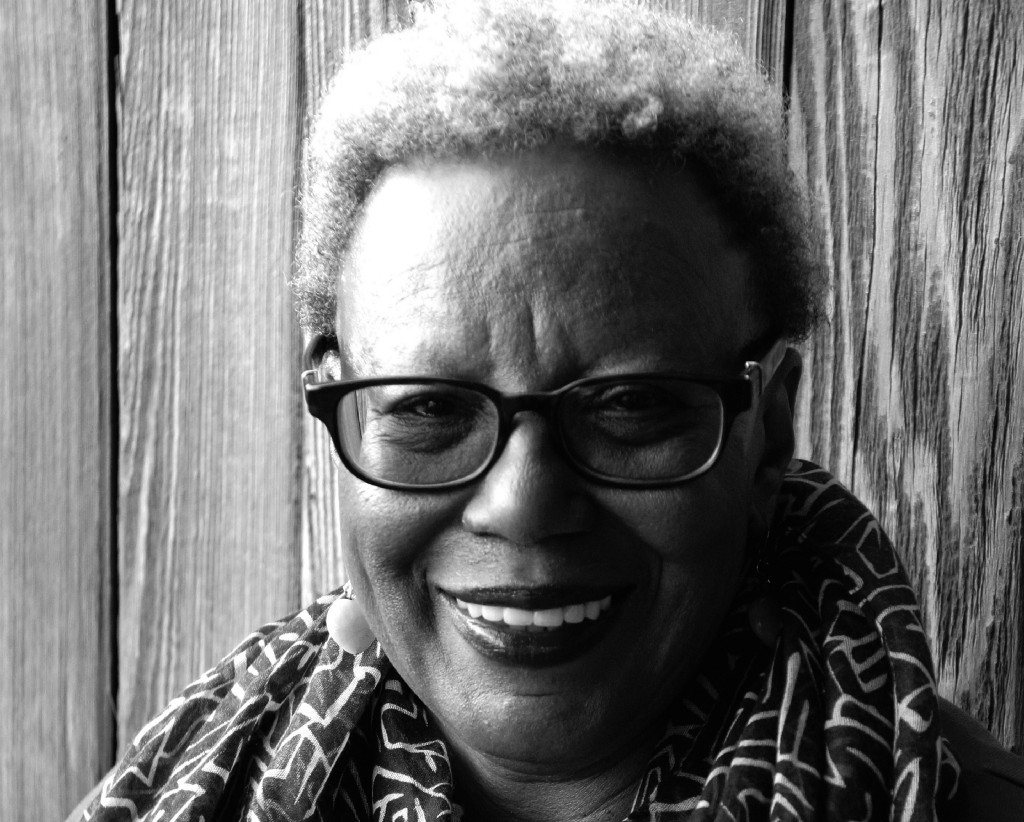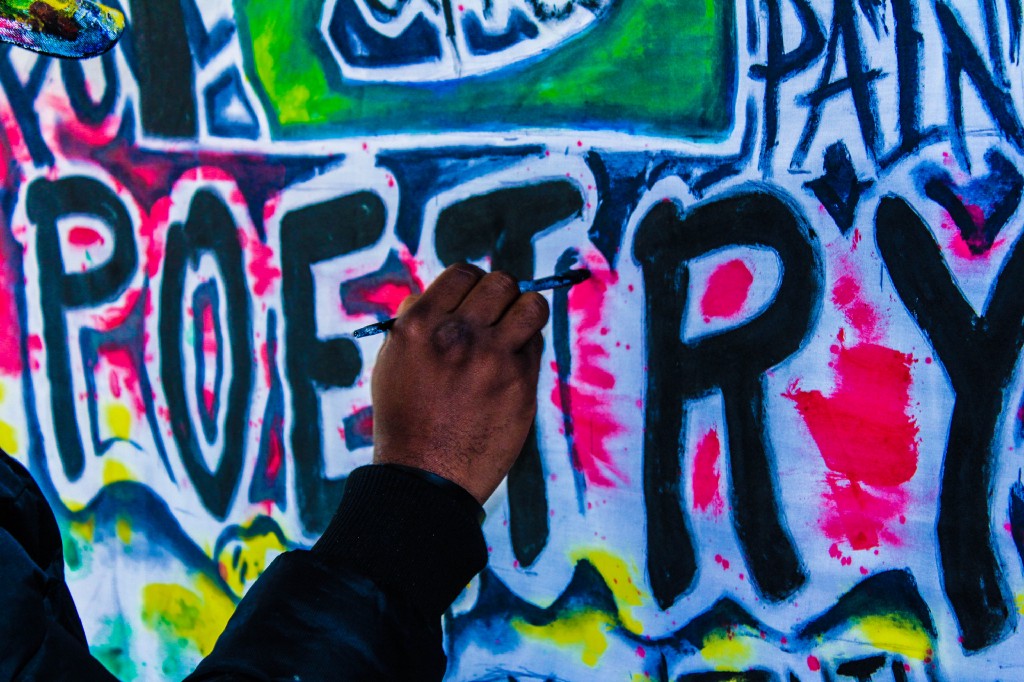Books & Culture
Why All Poems Are Political
Unregulated and innately radical, poetry is an urgent expression of freedom

Note: In September 2016, I began a fellowship at Harvard University’s Radcliffe Institute for Advanced Study, an opportunity to spend nine months in Cambridge, Massachusetts, as part of a group of 50 scholars, scientists, and artists while I worked on my new book of poems. In May 2017, near the end of my fellowship, I read some of my new work to the Radcliffe community; what follows is the short talk I gave to introduce my reading.
My talk is inspired by the Radcliffe fellows, many of whom have expressed to me, the lone poet in our cohort, that they wished they understood poetry better, its meaning and even its purpose. I remember being out on the lawn in Radcliffe Yard on a sunny September day and one of these 50 fascinating people I’d just met, waiting behind me in the barbecue line, asked “How do you know if a poem is good?” I don’t think I had a very coherent answer, if I was able to answer at all, but what I wish I had said was: “I don’t, isn’t that wonderful?” Because the first thing that I want to say about poetry is that a poem is an utterly free space for language; no objective and definite criteria could possibly apply to evaluate it. In fact, poetry is the only utterly free space for language that I’m aware of, and that is what makes it indispensable to me, and also what makes writing it and reading it a political act: Any act where freedom is urgently at issue is a political act, and any space that makes us aware of our innate freedom is a radically political space.
Poetry is the only utterly free space for language that I’m aware of, and that is what makes it indispensable to me, and also what makes writing it and reading it a political act.
When I first considered what I wanted to say about poetry to potential readers who had not yet found their way to it, my impulse was to write a manifesto or even a rant. But then I thought that maybe we hear quite enough ranting these days. Maybe the rant is so devalued right now, like a currency, that another mode will be more useful and buy more understanding. So I decided instead to ask some questions, which is poetry’s most important task anyway: to get you to listen and to get you to wonder. Who really listens to a shouter? Who wonders on command?
Both steps of this two-step process, the listening and the wondering, are important. The listening gives you pleasure and the wondering asks you to work — but it’s joyful work. It’s my hope that the questions that follow will, like a poem, be effective in getting the mind to participate in making the meaning of what I want to say here. Because another thing that I believe about poems is that they, more than any other kind of text, invite or even demand that readers lean in and become active participants in the joyful task of making meaning, another reason why reading or writing poetry is a political action. Once you get that intimate with language, just like when you get intimate with a person, you realize how endlessly complex meaning is and how endlessly supple language is. And you may start to crave more of these things, complex meaning and supple language, in public discourse.
Once you get that intimate with language, just like when you get intimate with a person, you realize how endlessly complex meaning is and how endlessly supple language is.
Before I get to the questions, I want to point out that poetry seems to get the attention of mainstream culture in two sets of circumstances.
We Come to Our Own Funeral in a Limo Just Like Prom — Three Poems by Molly Rose Quinn
First, every year or so, the New York Times or The Atlantic or some other media outlet with cultural prestige features an article with a title like “Does poetry matter?” or “Can poetry matter?” or “Why doesn’t poetry matter anymore?” As if some editor decided it’s time to dust off poetry’s potential to disappoint, like a brooding adolescent disappointed by grownups, simply because they have formed his consciousness, matter so much, and have been around a long long time.
Second, in times of public trauma or crisis, like our current trauma or like the aftermath of 9–11, the New York Times or The Atlantic or some other media outlet with cultural prestige features an article with a blunt heading like “Americans turn to poetry in times of crisis.” As if, to keep us from panicking, it’s time to break the poems out like expired Ativans that have been sitting in the nightstand drawer.
Both kinds of articles diminish the value of poetry by confining poetry’s occasion either to a distant past when poetry lived up to expectations or to the role of security blanket to be discarded as soon as the public crisis is past and life returns to “normal.” If my questions do take on a ranting or polemical tone, it’s this mainstream diminishment I’m talking back to. After all, the New York Times never asks “Does football matter?” or “Do restaurants matter?” or “Does television matter?”
After all, the New York Times never asks “Does football matter?” or “Do restaurants matter?” or “Does television matter?”
So, on to my questions:
How many people have to read a poem to make it worth writing?
Do the people have to be alive at the time the poem is written?
Does it matter that the Super Bowl will always have more fans than any poem I write?
If you think maybe it does matter, do you apply this capitalist model of value to everything in your life?
How impoverished would your life be if you did?
Would poetry be more valued if it cost more and took up more space?
What if poetry is the ultimate reality show: a site for confusion ambivalence complexity uncertainty and big and tiny feelings?
What if, in a world of increasing specialization, a poet is the ultimate generalist, whose “area” is nothing less inclusive than what it feels like to be human?
What if poetry is the ultimate reality show: a site for confusion ambivalence complexity uncertainty and big and tiny feelings?
Could poetry have begun as the chanting of vowel sounds around a communal fire, or by mothers to infants?
Which is more important, your mother singing to you or your mother telling you to eat your beets?
Which came first?
Which is more fundamental to you? Which makes you human?
The poetry I love most partakes of song. You might think about poetry as song with extra-strong emphasis on the words. If you like music and you like language, you’re the target market.
If a society doesn’t value poetry, the most essential art (I may be biased) because it is made solely from the very language that makes us human, is poetry fucked up or is the society fucked up?
Do we have other evidence that our society is fucked up?
Is it possible that everything that can be done is being done to numb you to the essential and infinitely subtle suffering and joy of being alive?
Is it possible that poetry wants to awaken your awareness of the essential and infinitely subtle suffering and joy of being alive?
Is it possible that poetry can awaken you without telling you exactly how?
Do we need to discuss difficulty?
Is difficulty something to discuss or something to experience?
Or both?
Has your life been without difficulty? Do you know from difficulty? Poems know from difficulty too.
Why shouldn’t a poem create a space for the language of difficulty?
Paraphrasing the poet Catherine Wagner, do you like understanding so much you want it to happen over and over?
Could it be that not-understanding or wondering is more honest and even less violent than knowing? If you can’t go that far, is it possible at least every once in a while?
Could it be that not-understanding or wondering is more honest and even less violent than knowing?
Can something be difficult and also a pleasure?
Could poetry be a pleasurable way to make friends with the endless complexity of existence?
Could part of poetry’s difficulty be that poems are made from something we’ve depended on since toddlerhood to communicate our basic needs? Is it a little disconcerting to encounter language that doesn’t have so much interest in informational exchange?
Could it be OK that language can be used to communicate basic physical and emotional needs and information and also to make crafted objects (i.e., poems)? Some water you drink, some water you swim in, some water sprays up out of an ornamental fountain.
Can you enjoy an art form that uses language like paint on a canvas?
Can you enjoy an art form that uses language like notes on a staff?
Can you enjoy an art form that uses language to make a frame for a picture that never quite gets hung in the museum?
Could it be OK to use language to give pleasure?
Could this pleasure be an act of resistance? Resistance against the debasement of language?
Could this pleasure be an act of resistance? Resistance against the debasement of language?
Are you starting to want some answers?
Here’s one possible answer: Poetry opens up spaces for language that echo through centuries. Poetry is the fresh stream that feeds the lake of language. Other streams also pour into the lake, with waters not so fresh and lively; in fact some of the other streams are dull, or toxic, or fake. Poetry replenishes and restores the lake of language. Do you need fresh water only under drought conditions or do you need it all the time? Even if you don’t drink directly from the spring of poetry, you drink from the lake of language the spring has fed and sweetened. Even if you don’t read poetry, I assure you that poetry is whispering to you. And maybe waiting for you to jump in.








